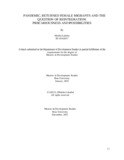Pandemic, returned female migrants and the question of reintegration: precariousness and possibilities
Abstract
COVID-19 has made life even more precarious for Bangladeshi female migrant workers. During the pandemic, they faced unfair treatments, wage theft, and other forms of exploitation in the host countries. A large number of women became the victims of mass deportation. Within these circumstances, the question of immediate reintegration became critical for policymakers and non-governmental organizations working with returnees. Building on the qualitative approach and Feminist Standpoint Epistemology, the study seeks to gather in-depth information and holistic insights concerning the reintegration challenges of female returnee migrants during the pandemic. It demonstrates how factors such as social stigma, limited access to the correct information, unemployment, and the ripple effect of unproductive investment work in deepening the precarious human condition of female returnees. Nonetheless, the study also makes visible layers of possibilities. The extended period of international migration and movement can positively impact women's intellectual and emotional maturity. The majority of research participants demonstrated a higher capability to make decisions and act independently on their behalves. The study proposes that policymakers take note of the active agency of female returnees along with their susceptibilities. It explains the implication of the dual policy focus in designing a more appropriate and gender-friendly model of reintegration.

